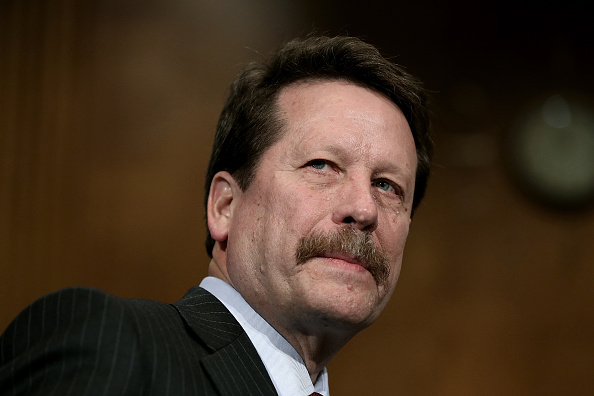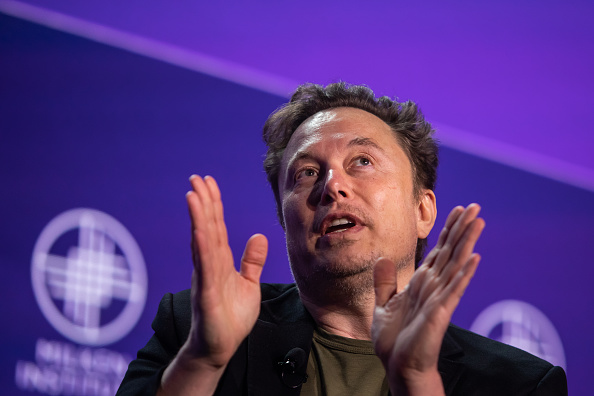Former
Food
and
Drug
Administration
Commissioner
Robert
Califf
was
in
Silicon
Valley
to
receive
an
award
from
the
Precision
Medicine
World
Conference
on
Wednesday.
In
a
fireside
chat,
Califf,
a
cardiologist
by
training,
addressed
a
range
of
issues
from
whether
precision
medicine
has
advanced
enough
to
how
he
would
advise
his
successor
at
the
FDA.
Prepare
for
Delays
The
FDA,
like
other
agencies,
is
being
reviewed
by
the
Trump
administration
to
weed
out
what
they
believe
federal
agencies
have:
inefficiency
and
worker
redundancy.
This
effort
may
shrink
the
agency
through
buyouts
—
the
legality
of
which
is
in
doubt
— or
layoffs
and
that
workforce
reduction
might
affect
timelines
of
products
submitted
for
regulatory
approval
to
the
agency.
“To
do
the
work,
you
actually
have
to
pay
people
and
they
have
to
exist.
So
if
enough
people
leave
FDA,
it
doesn’t
matter
what
the
law
says,
you’re
still
going
to
have
delays.
Remember
the
user
fees
came
into
existence
because
the
FDA
couldn’t
meet
the
timelines.
And
I
would
personally
love
it
if
the
taxpayer
paid
the
fair
share
and
we
didn’t
have
companies
paying
for
[regulatory]
activity.
On
the
other
hand,
user
fees
on
the
medical
product
side
have
made
an
enormous
difference.
It
is
like
a
business.
The
evaluation
is
done
by
civil
servants,
not
by
political
appointees,
but
it’s
done
on
a
timeline
and
those
metrics
are
watched
just
like
you
would
watch
any
other
business.
But
if
the
infrastructure
of
FDA
is
gutted,
it
won’t
be
possible
to
meet
those
timelines.”
Earlier
in
his
on-stage
interview,
Califf,
who
has
worked
in
the
private
sector
at
companies
like
Alphabet,
took
offense
at
how
federal
workers
are
being
portrayed.
“I
think
the
people
that
are
attracted
[to
the
FDA]
are
very
hardworking
people
and
I
also
have
to
say,
having
worked
in
all
sectors,
the
idea
that
federal
employees
are
lazy
or
not
as
good
as
other
employees
is
just
flat
out
wrong,”
he
said.
“But
that
is
the
rhetoric
that’s
going
on
right
now.”
He
recalled
how
his
career
at
the
FDA
began
as
a
deputy
commissioner
for
medical
products
and
tobacco.
“Despite
all
the
vilification
that’s
going
on
right
now
of
federal
employees,
it’s
an
amazing
experience
where
your
mission
is
the
public
health;
it’s
the
entire
American
public,”
he
said.
Abbott’s
Really
“Screwed
this
One
Up”
Califf
was
asked
about
the
lessons
he
learned
in
handling
the
infant
formula
shortage
and
he
explained
how
the
infant
formula
industry
was
hyper-concentrated
among
a
couple
of
players,
including
Abbott.
“The
industrial
base
for
manufacturing
the
formula
was
hyper-concentrated
in
a
small
number
of
plants
that
were,
let’s
just
say
out
of
date,”
he
said.
“And
so
when
chronobacter
[sakazakii]
was
going
all
over
the
plant
making
it
into
[the
infant]
formula
of
Abbot
—
and
I
say
this
as
a
cardiologist,
I’ve
used
a
lot
of
Abbott
products,
it’s
a
good
company
it
makes
a
lot
of
good
products
—
they
really
screwed
this
one
up
and
the
recall
was
necessary
because
you
can’t
send
out
bacteria-contaminated
formula
to
half
of
infants
or
more
[that]
are
heavy
users
of
formula
for
a
whole
variety
of
reasons
in
the
United
States.
The
shelves
were
bare
and
it
was
a
very
difficult
situation.”
Later
however,
the
company
cooperated
and
the
agency
began
co-managing
the
company’s
operations
tied
to
infant
formula
as
part
of
a
consent
decree.
But
the
FDA
wasn’t
blame-free
either.
Califf
said
that
there
was
a
structural
problem
at
the
agency
where
the
food
side
was
not
good
at
decision
making.
So
a
structural
reorganization
ensued.
“We
had
to
undergo
the
biggest
reorganization
in
the
history
of
the
FDA
—
that
happened
during
my
tenure
affecting
[many
thousands
of]
employees
—
to
create
a
structure
that
can
make
decisions
better,”
he
said.
FDA’s
Focus
on
Nutrition
is
Severely
Lacking
After
the
reorganization
of
the
food
side
of
the
agency,
there
are
three
components
within
it:
people
who
deal
with
food
safety
with
regard
to
microbiologic
and
viral
contaminants
of
food;
people
who
deal
with
chemical
safety;
and
those
who
focus
on
nutrition.
Food
safety
happens
to
be
the
“vast
majority”
of
what’s
funded
at
the
FDA,
followed
by
chemical
safety
and
then
there’s
nutrition.
“Chemical
safety
and
nutrition
at
the
FDA
have
been
dramatically
underfunded,”
Califf
said.
“And
nutrition
is
really
a
sad
thing
because
we
all
think
nutrition
should
be
better.
But
there
are
only
a
couple
of
dozen
people
at
FDA
who
are
paid
to
work
on
nutrition.”
What
Worries
Califf
the
Most
about
Artificial
Intelligence
Califf
is
not
worried
about
the
pre-market
aspect
of
artificial
intelligence
and
the
FDA
has
already
shared
guidelines
for
best
practices.
It’s
what
happens
after
the
products
are
deployed
in
the
real
world
“Health
systems
are
the
biggest
issue
here
because
as
we
get
more
and
more
into
generative
AI,
the
algorithms,
if
you
put
them
in
place,
they’re
going
to
change
and
you
don’t
know
whether
you’re
going
to
drift
in
a
better
or
worse
direction
unless
you
measure
it.
So
there’s
a
term
—
local
recurrent
validation
—
which
basically
means
the
algorithms
have
to
be
validated
as
close
to
continuously
as
possible
in
the
environment
in
which
they’re
deployed,”
Califf
explained.
“The
only
people
that
can
do
that
are
the
people
that
are
deploying
them.
That’s
our
health
systems.
I
don’t
know
of
a
single
health
system
in
the
US
today
that
has
the
tools
that
it
needs
to
do
this,
but
it’s
not
like
it’s
a
secret.”
He
Wasn’t
Optimistic
about
Precision
Medicine’s
Future
and
It’s
Been
That
Bad
An
audience
member
asked
how
Califf
would
evaluate
how
precision
medicine
has
evolved
in
the
past
decade.
The
answer
wasn’t
pretty.
“I
was
not
very
optimistic
10
years
ago
about
the
practical
application
of
precision
medicine.
And
I
would
say
it’s
been
just
as
bad
as
my
expectation,”
Califf
responded.
He
noted
that
there
has
been
tremendous
progress
in
the
understanding
of
human
biology
and
in
the
theory
of
how
precision
medicine
should
work.
But
that’s
as
far
as
the
benefits
go,
he
said,
noting
how
his
younger
brother
recently
died
of
pancreatic
cancer
despite
the
most
knowledgeable
experts
working
on
his
case.
“The
practice
of
precision
medicine
and
the
place
where
it
should
be
the
most
advanced
is
pathetic.
And
I
think
in
clinical
practice
we’re
still
in
an
era
where
just
getting
the
right
dose
of
drugs
for
serum
creatinine
is
a
major
problem.
The
idea
that
a
person
with
pancreatic
cancer
has
got
to
shop
around
to
our
best
cancer
centers
to
find
a
protocol,
it
is
just
not
right.
But
the
same
would
hold
for
a
person
that
comes
in
with
a
creatinine
of
two
and
needs
to
be
on
a
renally
adjusted
dose
of
a
drug.
And
the
idea
that
a
doctor
using
the
cerebral
cortex
of
one
individual
human
being
can’t
even
remember
that
is
not
a
very
smart
thing.
Let’s
let
machines
do
the
things
that
machines
do
better
and
let
the
human
part
focus
on
the
oversight
and
the
interaction
with
people
that’s
needed.
So
yeah,
I
think
it’s
just
as
bad
as
I
thought
it
was
going
to
be
back
then.”
His
Advice
for
his
Successor
at
the
FDA:
Marty
Makary
Califf
expressed
his
hope
that
Marty
Makary,
nominated
by
President
Trump
to
lead
the
agency,
would
trust
in
the
expertise
and
the
independence
of
the
FDA.
He
explained
that
a
big
part
of
the
job
is
fielding
calls
from
lobbyists,
from
people
trying
to
influence
Congress
and
even
deal
with
threats
of
budgetary
cuts
from
any
congressional
leader
who
feels
slighted
for
some
reason.
“So
the
main
advice
is
trust
in
the
expertise
of
the
people
that
work
at
the
FDA
and
get
to
know
them
well
and
when
making
changes,
make
sure
that
they’re
involved
in
it,
and
then
focus
on
evidence
—
[there’s]
still
a
lot
of
work
to
do
to
get
the
evidence
right,”
he
said.
Photo:
Win
McNamee,
Getty
Images



















